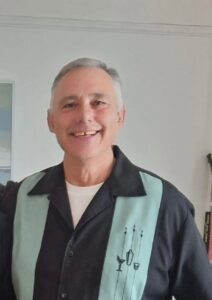After retiring at 66 in June 2023 and a busy summer caring for my grandchildren, I developed a chest infection that took months to recover from fully. In early 2024, I decided to visit my GP for a “health MOT” to ensure everything was okay. Several tests were conducted, including checks for blood pressure, cholesterol, and blood tests, which revealed elevated liver markers. I also learned that I was pre-diabetic, with a blood sugar score of 42. This led to a prompt referral for a FibroScan—a non-invasive liver scan—conveniently performed in a white NHS mobile unit parked outside my GP surgery as part of a community service.
My FibroScan score came back at 11.9 KPA, significantly higher than normal, indicating possible fibrotic or cirrhotic damage. I was alarmed, especially as someone who had always been active throughout my 24 years of military service. While waiting for further investigations, I immediately began making lifestyle changes, incorporating more walking and swimming into my routine. The doctor provided guidance on maintaining a healthy liver—by cutting out alcohol, eating healthier, and staying active. I also started researching liver health, accessing information on the British Liver Trust website, and gathering resources about my condition.
In April, I underwent further tests, including an ultrasound on the 3rd, followed by both CT thorax (chest) and MRI scans on the 12th. In early May, I received the results of the CT scans, which revealed a 1.4 cm lesion on my liver. There was concern it could be malignant, so I was scheduled for a PET scan to determine if the lesion would “light up,” indicating potential cancer. Although the lesion’s nature was still uncertain, it appeared to be confined to my liver. As a precaution, I was scheduled for microwave ablation, a procedure to remove the lesion.
On July 2nd, I had the procedure. What was meant to be a day procedure turned into an overnight stay due to unexpected discomfort. I experienced pain in my chest and side post-anesthesia, and I recall the senior liver nurse telling her colleagues, “We need to keep him in overnight.” The nurses in the liver unit took exceptional care of me, closely monitoring my blood pressure and ensuring my comfort.
A few weeks later, I had another CT scan, and on August 8th, I learned that the operation had been successful. However, the scan also revealed a new, smaller lesion, about 7mm in size. The doctors weren’t overly concerned, but I was scheduled for ongoing monitoring, including a follow-up FibroScan at Derriford Hospital.
The results from the FibroScan showed significant improvement. My liver reading dropped from 11.9 KPA to 6.5 KPA, and my CAP score, which measures liver fat, decreased from 323 to 266. The technician performing the scan reassured me, saying, “You would never have known you had a liver problem.” It was a relief to hear that.
Throughout this eight-month journey, I have learned more about managing my health. Nutritional advice led me to adopt a healthier diet. By April, after my initial scans, my blood sugar levels dropped, and my cholesterol improved as I embraced these lifestyle changes.
I feel incredibly fortunate to have received such informative and supportive care. The South West Liver Unit has been exceptional, providing me with detailed information through phone calls and letters, while the British Liver Trust website has served as a fantastic resource. I also received excellent post-surgery care, which was crucial for my recovery.
I’m grateful for the incredible support from my healthcare team and the NHS liver program, and I’m optimistic about the future. This experience has taught me that with the right care and lifestyle changes, we can all take steps to stay healthy.
Now, as I look ahead, I’m excited to enjoy my retirement to the fullest.

